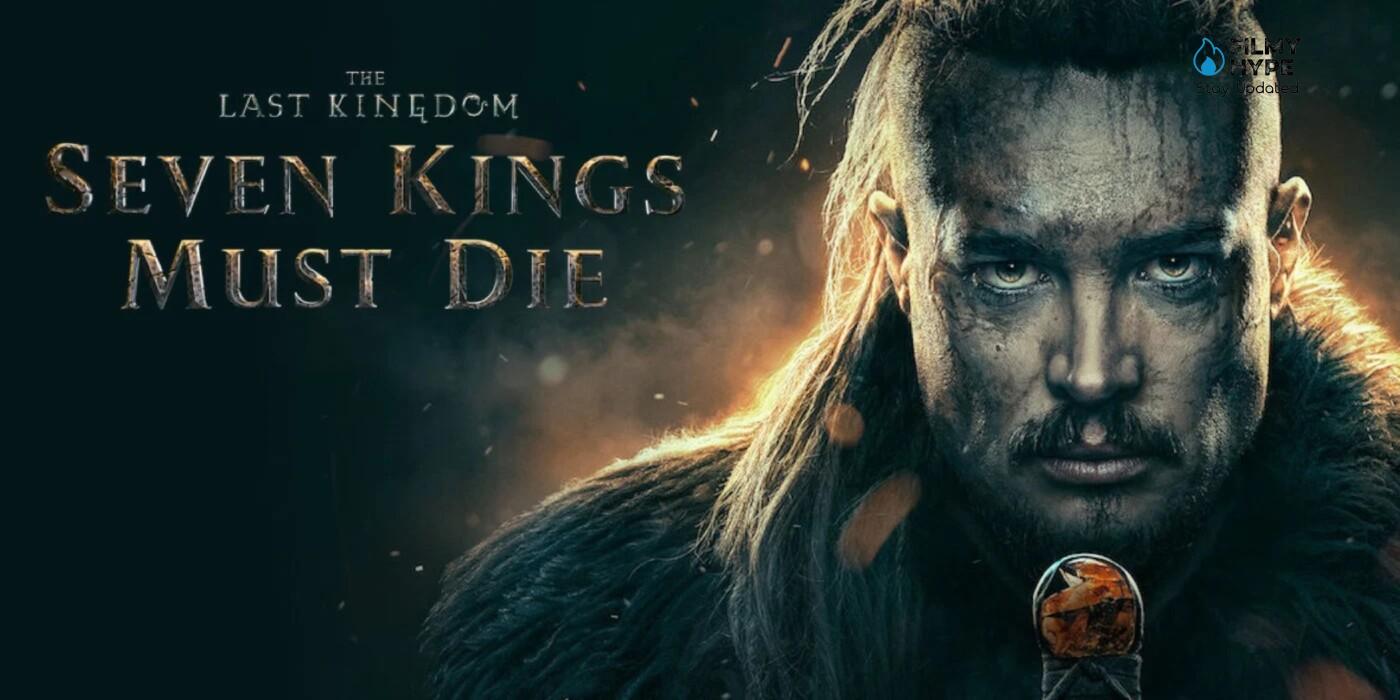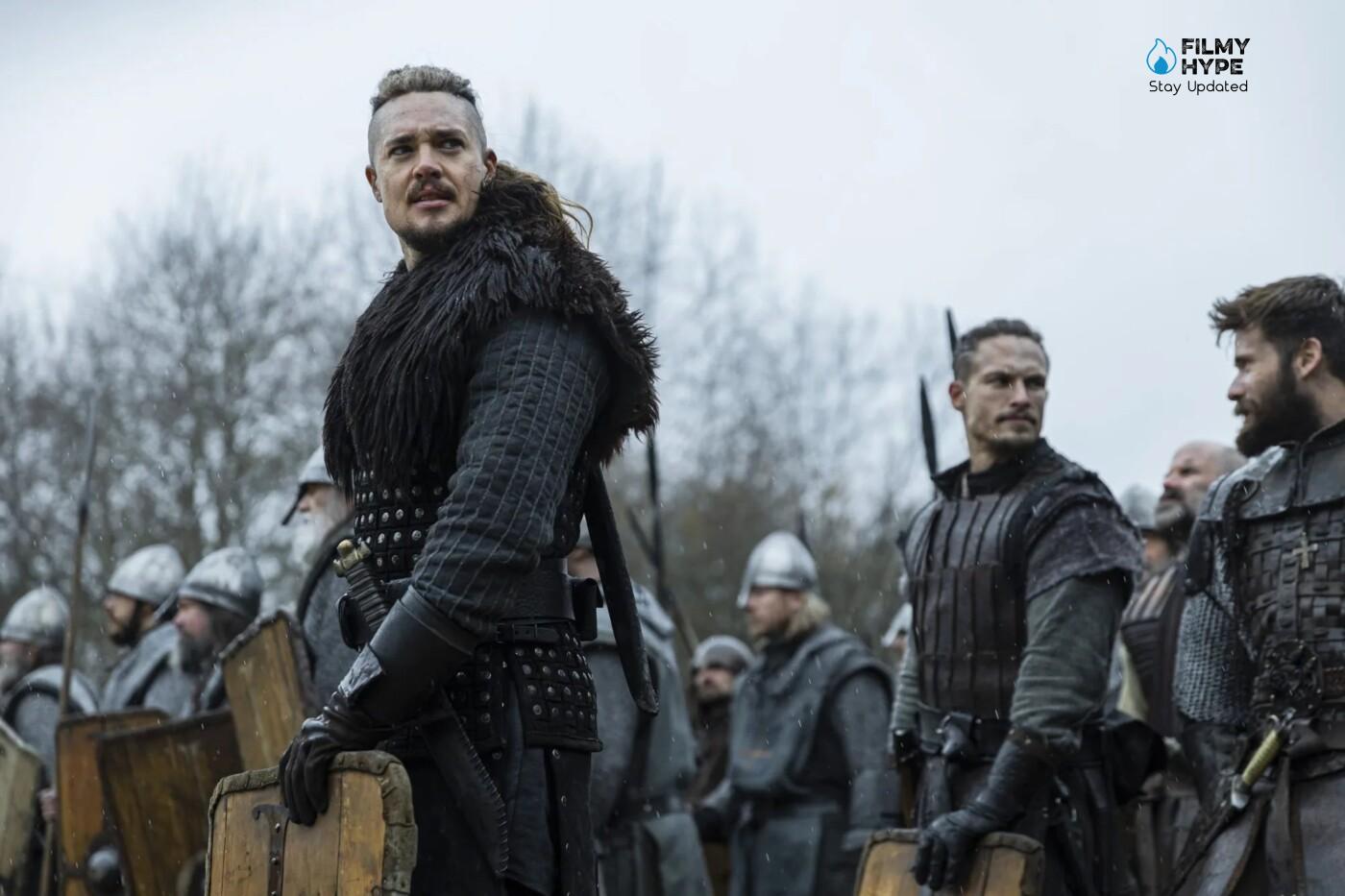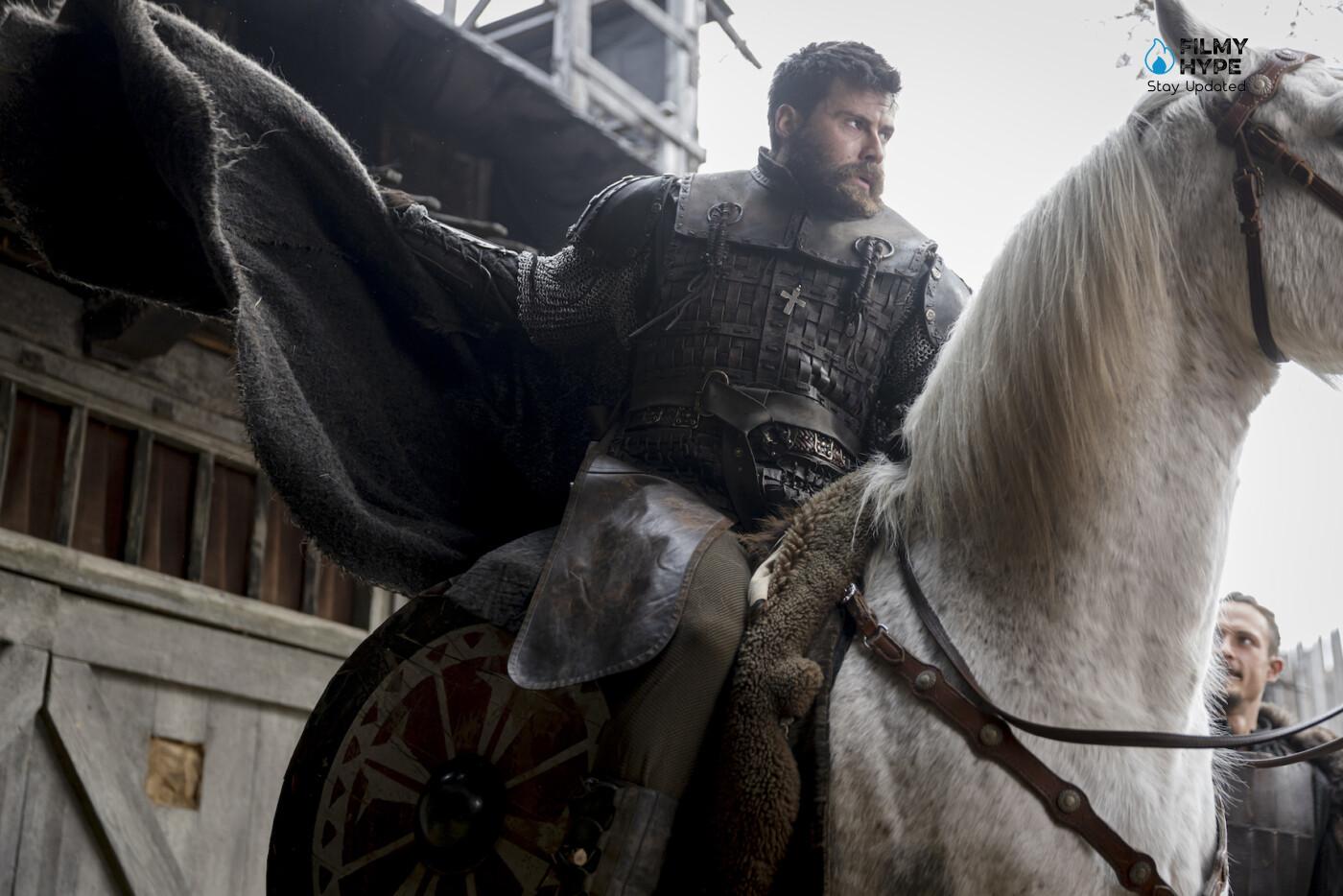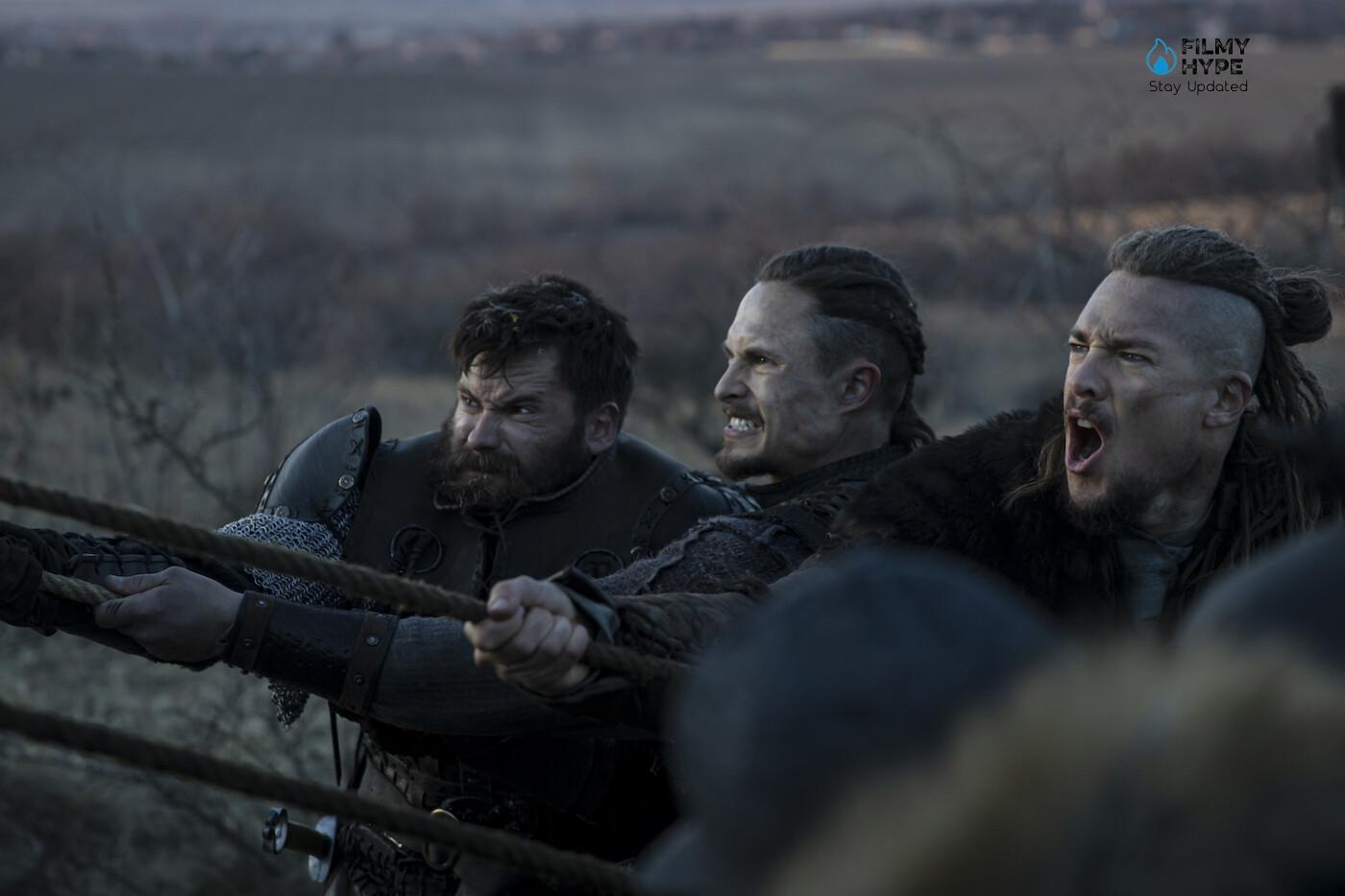The Last Kingdom: Seven Kings Must Die Review: Epic, Blood and Bad Advisers | Netflix Film
Cast: Alexander Dreymon, Harry Gilby, Mark Rowley
Director: Edward Bazalgette
Streaming Platform: Netflix
Filmyhype.com Ratings: 4/5 (four stars)
The Last Kingdom: Seven Kings Must Die, is an epic film that seals the fate of Uthred and the English kingdom. After five seasons – the first two produced by the BBC, and the following three by Netflix – the television saga of The Last Kingdom, an adaptation of Bernard Cornwell’s bestsellers, reaches an epic final act. The time is the tenth century, and what we now call Great Britain has been the scene of an all-out war between the invading Vikings and the Christian Saxons for over a hundred years. The protagonist – born Christian and raised Danish – has finally regained possession of the fortress of Bebbanburg, which belonged to his family for generations, and was usurped during his childhood.

After years of fighting alongside King Alfred to help him realize his dream of a free and united England, Uthred had to deny this achievement to his son Edward, becoming himself the lord of a small buffer state in Northumbria, at the border with Scotland. A bittersweet ending, which certainly could not represent the final act of a saga that rivaled Vikings for eight years, standing out for its intensity, quality, and care for the historical setting: to conclude the series in the best possible way, Netflix has chosen to make a final film, which sees the return of Alexander Dreymon and the entire cast of the series. Here’s our review of The Last Kingdom: Seven Kings Must Die, and let’s remember it: “Fate is everything“.
The Last Kingdom: Seven Kings Must Die Review: The Story Plot
The film picks up a few years after the final events of the fifth season. Uhtred is finally the lord of Bebbanburg and his subjects live in peace while in the rest of England, the shadow of a total war becomes more and more pressing. Upon the death of Edward, (Timothy Innes) the clash between his descendants will throw the kingdom into chaos. Athelstan’s (Harry Gilby) actions as the new ruler will then increase the resentment of the people and the ranks of enemies. Uhtred will have to fulfill his oaths once again and choose which world to belong to. It is on these foundations that The Last Kingdom: Seven Kings Must Die kicks off. The first scenes point to a frenetic montage, almost psychedelic we would dare to say. A wild ride to enclose as much information as possible in a few minutes. The spectator is thus bombarded with names he had forgotten and others yet to be assimilated. Also, it’s been years since the start of the TV series, by which time Uhtred has survived three generations of royalty. The character, however, doesn’t appear to have waged a day, except for a few wrinkles around his eyes. With no white hair or aches, the protagonist fights as if he were still in his prime.
“Seven Kings Must Die, and also the woman you love.” A prophecy heard in a dream by Finan’s wife hovers over the fortress of Bebbanburg, where Uthred and his fellow adventurers have now retired to enjoy the fruits of the fragile peace conquered several years earlier. The balance, however, is about to break: King Edward of Wessex, son of Alfred, has just died after a long illness, and the enemies are already ready to take advantage of it. The wolf warriors of the Danish leader Anlaf, who arrived from Ireland, begin to make raids on the English coasts, but a much more sophisticated plot is about to upset the fortunes of the kingdom. The cunning Anlaf has eyes and ears everywhere and aims to form a coalition with the other Christian and pagan kings of the island, from Scotland to Orkney, from Shetland to Strathclyde, even passing through the Isle of Man.

His experience speaks clearly: “When a king dies, the Saxons always turn against each other”, and indeed the current vacuum of power could be the ideal opportunity to annihilate the throne of Wintaceaster once and for all. Meanwhile, the former disciple of Uthred, Athelstan, must fight with his half-brother Aelfweard to conquer the throne before it’s too late: in him, however, something has profoundly changed, and the influence of the adviser and lover Ingilmundr is pushing him to make increasingly aggressive and unscrupulous choices. Uthred will desperately try to bring the young ruler back on the right path, but time is short, and the shadow of the prophecy now hangs over everything: Edward is dead, and six other kings are destined to follow him to the grave in the great battle of Brunanburh. But what will become of Alfredo’s dream of a united England?
It’s a minor element, you might say, but even the little things can make a difference. The same goes for the companions, from Sihtric to Finan (Mark Rowley). Having said that, the frenzy mentioned above leads to a poor understanding of the actions of the characters. These moves moved by simple and rarely investigated emotions. The Last Kingdom: Seven Kings Must Die is a ship in a stormy sea and we, the audience, are her hapless crew. We arrived safely on shore yet dazed. Alexander Dreymon had to draw on all of his charisma, thus keeping the entire film on his shoulders.
The Last Kingdom: Seven Kings Must Die Review and Analysis
A premise is obligatory: Seven Kings Must Die is certainly not a film in its own right, and the idea of being able to enjoy it or review it as such is absurd and unthinkable. We are in the presence of the last episode of the TV series The Last Kingdom, which is responsible for bringing the saga of Uthred to an epic conclusion, and both director Edward Bazalgette and screenwriter Martha Hillier are well aware of the weight of their responsibility. It matters little, therefore, if the screenplay may seem a bit rushed at times, or if it doesn’t care too much about contextualizing the events for the benefit of any newbies, opening the narrative in media res and riding at full speed up to the spectacular battle of Brunanburh.
The viewer already knows every character, from Uthred to Athelstan, from Finan to Father Pyrlig, and from loyal Aldhelm to proud King Constantine of Scotland, and the film chooses not to waste the little time available, capitalizing on the excellent work carried out over the last few seasons of the series to give us an epic and majestic finale. Consequently, we suggest you review the story of the last season of the TV series, because the film is designed specifically for fans, and will not give anyone discounts. This is a particularly effective and convincing solution: instead of “extending the broth” with futile antecedents, digressions, and interludes, Seven Kings Must Die pursues the spectator with an increasingly frenetic succession of events, keeping the tension constant and raising them at stake until the grand finale, which manages to give a memorable and moving epilogue to the five seasons of the series.

Seven Kings Must Die is a film that brings together historical verisimilitude with epic, and gives us two hours of pure emotion, drawing heavily on the great themes that made Bernard Cornwell’s literary fortune and characterized the five seasons of The Last Kingdom. In particular, the archetype of the bad adviser returns to the spotlight, and with it also the political reflection on the influence exercised by the so-called “grey eminences”, from Richelieu to Rasputin. In this case, to plagiarize the mind of the young king Athelstan is Ingilmundr, a sneaky Danish convert to Christianity and fond of bibliomancy who over the last year has become the privileged confidant and lover of the boy. Impossible not to think of the bad advice of Alfredo’s wife, Aelswith, or of Edward’s father-in-law, Aethelhelm: Uthred’s destiny has always been to clash with the gossip of the palace and fight for the soul of the rulers.
Here, however, there is no time for subtleties and gradualness: the precipitation of events and the lack of an entire cycle of episodes available forces the authors to confront us with accomplished facts, with the young king already (irreversibly ?) plagiarized from Ingilmundr. For the rest, the film declines the Cornwellian epic in the best possible way, which passes through a meticulous reconstruction of the historical and political scenario, and the construction of well-defined social identities: it is not only the columns that make the great final battle spectacular sounds and the excellent directorial choices that accompany the strategies of the leaders and the prowess of Uthred, but also and above all the feeling that on the one hand, for the first time, there is finally “the English” – whatever this new, strange word means – while their enemies stand on the other.
Even in Seven Kings Must Die, as, in the course of the five seasons of the TV series, the natural charisma of Alexander Dreymon contributes decisively to transfiguring the quality of the script and the directorial choices, to whom he deserves an honorable mention. At ease even with an improbable wig (which, fortunately, disappears at the end of the first sequence!), the star of The Last Kingdom returns to take on the role of the protagonist of the saga with a truly surprising naturalness, and once again manages to outline the hallmarks, from stubbornness to heroism, and from bravado to profound humanity, with a few simple voice inflections. Although the Italian dubbing has done an excellent job in adapting its emphatic tones and its natural authority, in the case of Seven Kings Must Die we are forced to warmly suggest that you adopt the original language version, possibly with the help of Italian subtitles from Netflix: Dreymon’s latest performance as Uthred truly deserves to be enjoyed in its original language!

With the release of the excellent Seven Kings Must Die and the definitive conclusion of The Last Kingdom, we have to see how the TV series dedicated to the life of Uthred of Bebbanburg is by far the best television product in circulation dedicated to the Viking Age. To be even more explicit: with the release of the final film, The Last Kingdom hands down the “derby” against Michael Hirst’s good Vikings, concluded in 2020 and currently continued by the spin-off Vikings: Valhalla. The victory is sanctioned by sharper and more inspired photography, a more accurate direction, also and above all a much more mature and aware approach to historical sources, thanks to the superior narrative skills of Bernard Cornwell.
Uthred is a fictional character, as are Finan, Sihtric and his other adventure companions, while Alfredo, Edoardo, Costantino, Athelstan and the other rulers are real historical figures. The dividing line between reality and fiction is particularly clear, and the film takes care to reinforce it with a solid narrative justification: at the end of the feature film, our protagonist asks Athelstan to leave him out of his historiographic chronicles, as he had already done Alfred. The events seen on the screen throughout five seasons, from the battle of Ethandun to that of Brunanburh, have been reconstructed with great verisimilitude, and rarely has the series bent or warped them to fit narrative purposes, leaving the fictional characters instead the task of enriching and “coloring” the events without ever altering the story of the history books. Unfortunately, Vikings has not been able to do the same, and between far-fetched trips to Russia, conversions, and never fought wars it has upended the destinies of Ivarr, Bjorn, and Bishop Heahmund. Even in this, we recognize the quality of a saga.
The Last Kingdom: Seven Kings Must Die Review: The Last Words
Seven Kings Must Die concludes the Uthred of Bebbanburg television saga in the best possible way, giving an excellent ending to the best circulation TV series of the Viking era, and combining epic, emotions, and historical realism. To conclude, The Last Kingdom: Seven Kings Must Die is not the grand finale we expected. We’re happy to see Alexander Dreymon’s Uhtred and his devoted companions one last time, but it’s only half a joy. The storyline created for Finan is superficially managed in our opinion, in the same way as that of Athelstan. That said, the spirit of the show permeates the entire product, or at least in some well-crafted scenes. Haste and compression are the masters, creating quite a bit of confusion in the opening bars. The last scene, on the other hand, dampens the pathos, and breaks the sense of the myth, of being transported to a distant era; we would have gladly done without it. In short, The Last Kingdom leaves us like this, with a deep sense of bitterness in our mouths.







